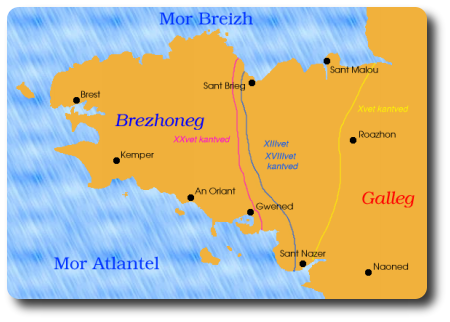Celtic Survival
not many people are really aware of how close to extinction the Celtic cultures are. first, a definition: a Celtic culture is a culture that speaks a Celtic language. the only other possible definition for a Celtic culture is an archaeological one, and refers to people who are now dead, so it isn't useful.
this means that one needs to look at what areas of the world still speak a Celtic language as a community language.

here's where in Ireland you can find such places.

and this one's for Scotland, though it is slightly exaggerated here, because the Scots government apparently considers the whole Highlands area to fall into the category of Gàidhailtachd, which is patently not the case.
Manx Gaelic (Gaelck or Gaelg) is almost entirely gone, but may be seeing a comeback similar to Cornish (below).
Welsh (Cymraeg) is much better off, having a sizable Welsh-speaking population scattered all through the nation. Welsh is, in fact, the big Celtic language success story.
Cornish (Kernuak) is another interesting, and major, success story. it's not so much that it has a lot of speakers, but that it has any at all now. there was a time, fairly recently, in which the last person to have spoken the language died. now, thanks to a massive effort by a lot of Cornish people, the language has been revived from its near-death experience, and has several hundred speakers, including a small number who have learned it as their first language.

Breton (Brezhoneg) is holding on by the skin of its teeth. in the face of the notorious French language laws, it is struggling to simply gain recognition as a legal language in modern France. this is one that, even if it does survive, has been strongly influenced in recent years by French, and is losing its Celtic character.
we've already lost Devon's Celtic language, as well as Galego, the language of the Galicians in northern Spain.
part of the problem is that Celtic areas are seen as backward and poverty-stricken, much as Americans might see Mississippi. this means that no one wants to stay there, raise a family there, speak the language of such a losing group.
now, under constant attack in the British media, some people are starting to accept the idea that genetics have anything at all to do with Celtic culture (see, for instance, the absurd article at http://www.msnbc.msn.com/id/5955701/, which has been widely printed for some unknown reason). since a genetic argument would easily fall to its own internal contradictions, the redefinition of "Celtic" in genetic terms helps to disrupt the ability of people in Celtic nations to work toward cultural survival. after all, why work toward the survival of something that "isn't real". (also, in that article, even if one accepts "genetic" cultural markers, the notion that red hair is somehow "Celtic" is very wrong. it was widely considered a Germanic, not Celtic, trait, under the old, racist, categorizations.)
the biggest problem that the anti-Celticists face is one that should vex them to no end. if these areas are not Celtic, why do (or did, in the case of much of Britain and Northern Spain) they speak Celtic languages? if the only Celts are those in Gaul, Belgica, the Rhine valley, Northern Italy, and central Anatolia, where did the Gaelic (Gaeilge, Gàidhlig, Gaelg), Brythonic (Cymraeg, Kernuak, Brezhoneg, Galego, and others now lost), and Celtiberian languages come from?